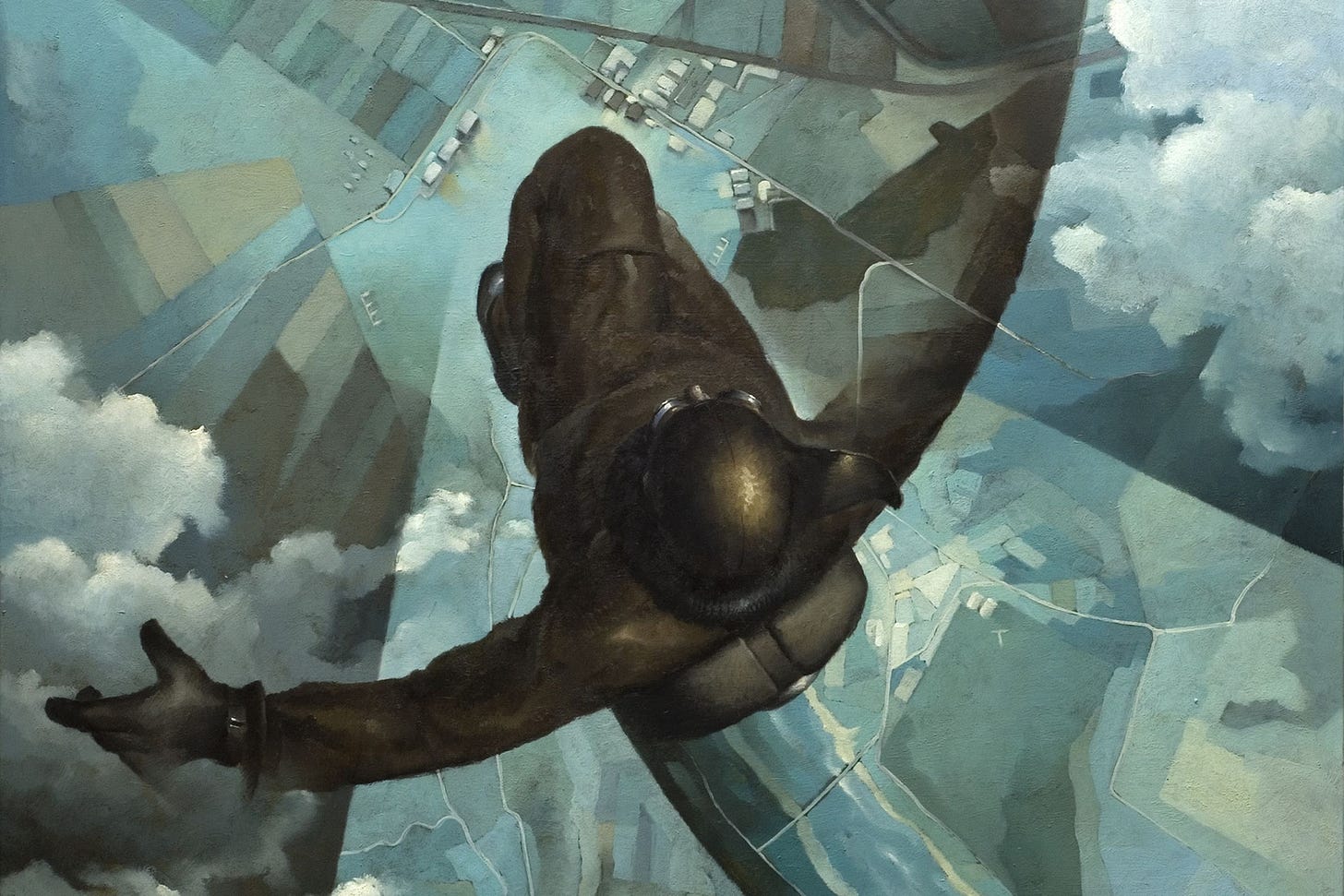Much to my joy, several folks in the dissident circles I frequent have taken up the risky challenge of questioning the hard sciences. This is quite the taboo in the era of Trust the Science™, but also an inevitability after hard sciences were fractured in the name of this rotting Old Regime. It is also a noteworthy departure from the traditional attack avenue of the past few years: critiquing the soft, such as over at SuspendedReason’s blog.
Many of us have, in some way or another, suspected that the hard sciences aren’t so ironclad as Sagon and Asimov told us in yonder years. We’ve all seen the classic teaching vids produced between the 1960s through 1980s in which these were the undeniable real. Yet, as the years have marched on, certainty has degenerated into cringy hand-waved half-theories from the likes of Neil deGrasse Tyson and Michio Kaku. They are increasingly unbearable to the extent that one may make an idiom: cringe flows from fear - fear they’ve spent their years barking up the wrong tree.
One of the holy grails of this collection of aging eggheads is the existence of alien life. For one reason or another, this is the question they’ve decided to build their world view on. It’s hard to figure why, but that’s what they picked. They hold its existence to be the necessary proof of their moral landscape. Why? Let’s think about that!
Recently, Charlemagne invited me on to speak about a number of the weakened and rusted foundations of the hard sciences, and followed up with a substack post over at the Old Glory Club, in which he explained it in such a perfect and brief way:
The spiritually weakened human is frightened at the prospect that he might bear sole responsibility for consciousness and morality in the universe, and he is desperate to be liberated from this responsibility by pawning it off on some robot, or at least through annihilation.
What the modern scientist’s obsession with alien life reveals is a timeless fear of responsibility. In the same way Old Cain went fleeing east of Eden, or Moses went into the desert after killing a man, or indeed today how troubled young people go traveling to avoid their responsibilities, people have this idea that they can run away and let someone else do what’s required of them. If you are a scientist, tasked with understanding reality, facing the truth that you must tell the people they are the only life and have a responsibility to preserve it can often lead to cherry picking hard sciences that allow him to offer an avoidance to this moral responsibility. In simple terms, his soft sciences rules how he sees the hard. He will actively resist and overlook hard data that contradicts his, or his sponsor’s desire to escape this responsibility. He will wiggle around data - data that could hold the key to new and exciting technology - just so that he can declare life is meaningless, and someone else can probably spread life to the galaxy. “Do not worry, dear people. Listen not to your role as gardener. You have no moral responsibility to your kin, or God, or life itself to till the Earth. Your passing and going ought not be noticed on the longer time scales”. If the scientist be the modern priest, how pitiful a forgiveness of sins he offers.
Indeed one may ponder: If they will ignore the data pointing to their being the only life, what else have they ignored in this pursuit of abandonment?
Despite all this, people questioning sciences hard and soft for a higher standard of care is nothing bad, and a refreshing resistance to the Nihilism of current philosophies. Charlie’s essay begs us to ask why we look at the stars the way we do today, and if there may be another way to understand our station in this universe: We are alone, and the universe is dead. It truly is our responsibility to till the Earth- the dust of every world, not just ours. To enliven the dead cosmos.
Whether Charlie realizes it or not, his essay contains within it the embryo of a Neupolitik. One which reinvigorates man as an active agent in the cosmos, and joyfully embracing his original role of gardener back in Eden. But to understand that Neupolitik, let’s take a ride back and understand what induced the Oldepolitik.
Progress was banging on the door of our civilization for many centuries. However, it couldn’t find any footing until the 19th century. Have you ever considered why? Consider this, dear reader. Could one argue progress finds its origin myth along the railroads of Britain, Europe, and America? Perhaps it is no coincidence that the nations which first developed railroad infrastructure were also the first to house progressive political organizations? My highschool AP History teacher had a conspiracy about this - that something about seeing the world wiz by for the first time in history changed the perspective of many. It was their first experience of being uprooted and, in some sense, atomized. For those that feared responsibility, it was the first time they saw a real way out; a real escape.
Now, I see some eager to point out Colonization offered this too, earlier. Where was progress then? Yes, but it was always very slow. You never could truly escape. You had to support an early colony, after all. You had to do your part. Yes, you could get away from people in the olde country, but if you were the problem to start with you’d just make new enemies in the new country too. More-often, colonization offered a testing grounds and those that came to see they were the problem, not those they fled from, would conform to some stabilizing religion or ethic - probably why America had so many Great Awakenings.
The colonies of old can really be divided up into kinds. There were attempts to make new European civilizations, which mostly worked. There were also attempts to get native civilizations up to European standards - the famous “White Man’s Burden” - which by and large utterly failed. In the famous sermon of Martyn Lloyd-Jones titled “Darkness and Light”, Martyn criticizes the eagerness of Christians to go off to “Darkest Africa” to preach while leaving “Darkest England” to its pagan degeneration. That’s not to say don’t preach to the third world. Rather, preach and let them figure out their own destiny. There is no Biblical call to force Africans to be Europeans. Only to be Christians.
But, if we focus on the rather successful attempts to create new European civilizations, we have some interesting data. Far from progress, the colonies of old acted as arks for the eras that built them. In America’s case, Medieval England endured throughout the Hinterlands of the Old Dominion and Empire States - still preserved in part to this day, all the while England has become a pagan cesspool. The preserving nature of these sorts of colonies ought to be kept at note here.
For these reason, the social pariah could never find a real escape in the colonies. He would ultimately be crushed into conforming to the needs of the colony, go home because it was too hard, or simply die. The Locomotive, on the other hand, offered the first real ability for people to cheat, steal, and be awful, and run away from their consequences for a very cheap price. Not to some hard frontier, but to the next town over. Before anyone could catch you, you could already be doing the same sleazeballing ten times over. Furthermore, the locomotive offered internal rapid mobility, rather than the long distance slow faux escapism of the colonies.
The Locomotive, thus, offered the progressive instigator several things he never had access to in any other era:
A population of people able to do dirty tricks at an industrial, repeatable scale.
An ever-growing population of uprooted and atomized city workers
A means of rapid mobilization across a civilization.
Thus it ought not be any surprise the progressive movement was born along the railroads of established civilizations, and not the budding civilizations of the colonies.
If this catches your eyes, a good entry point to my teacher’s conspiracy theory doesn’t come from the early railroad years, but from the early days of the car, which in many ways was the next best thing. If you’re reading this you’re probably familiar with the Italian Elite Theorists. Contemporaneous with them were the lesser-known Italian Futurists, who were obsessed with both the train and the car as symbolic metrics of progress. While you may be familiar with some of the morbid and disturbing art by those that experienced World War One on the Somme, Italian Futurists had no such experience and instead focused on the bedazzled new weapons and technologies that reflects the radically different experiences of Italy in the war.
“Before The Parachute”, 1939. Italian Futurism often emphasized the adventure of war.
Some Futurists believed the faster a nation could run its trains, shoot its bullets, and devastate its enemies represented the nations most friendly to progressive views. Were they wrong? As they found out from a generation of train-goers, the ease of uprooting yourself with a single train ticket gave way to an ease of abandoning your social responsibilities - a generation of pariahs and laborers. Is it any wonder that the automobile, likewise, gave birth to a generation of gilded whores going bar to bar looking for the next fling to use and run away from? (I am not insulting the car itself, but rather the consequences of cheap cars)
You may find it amusing that Ivo Pannaggi, one of the Italian Futurists, depicted progress as an abstract industrial train plowing through traditional colors you might see in local townscapes wizzing by at top speed.
Contemplate this painting to one of Pannaggi’s friends, the author of The Futurist Manifesto, F. T. Marinetti:
Up to now literature has exalted contemplative stillness, ecstasy, and sleep. We intend to exalt movement and aggression, feverish insomnia, the racer’s stride, the mortal leap, the slap and the punch. We affirm that the beauty of the world has been enriched by a new form of beauty: the beauty of speed. A racing car with a hood that glistens with large pipes resembling a serpent with explosive breath.. ..a roaring automobile that seems to ride on grapeshot — that is more beautiful than the Victory of Samothrace.
If you have the time, I strongly suggest you read The Futurist Manifesto. It isn’t long, but it defined an era in arts and architecture. It is a kind of detailing of Progress’ Zeitgiest few have better captured.
The Italian Futurists were obsessed with the never-before-seen perspectives that technology allowed, and saw this as a representation of Progress - how one might capture that zeitgeist in the frame to control and imagine. In another piece, the warped experiences of seeing a city from the new technology of the aeroplane is painted by Tullio Crali in 1938:
Any Neupolitik which seeks to contend with progress must first contend with this uppityness - must first justify to the people why we should slow down and stop hopping and running away from our responsibilities. The writer of such a Neupolitik must contend first with the thinkers of progress, such as those found in these Italian theorists. While rocketships and space conquests may bring to mind high speeds and radical changes, this actually stands in steep contrast to the existing progressive zeitgeists of speed, change, and acceleration because of one detail: A rocket must slow down.
Trains and cars slow down too, of course. They slow down to pick up new peoples to atomize and uproot. A rocket, on the other hand, slows down, and stays. A rocketship, as the name implies, is a Rocket Ship. Thus it is far more similar to the colony going ships of old than a commuter train. The Rocket Ship, although it travels faster than all the tools of atomizing progress, simply cannot support the atomization process. It is an inherently deatomizing technological artifact. The people on a rocket ship know they will be stuck with the people they see around them for months, and maybe even years. They cannot run away from responsibilities. They will die if they do. Just like the colonies of old, the people on a Rocket Ship are in a filter of sorts. The only people that survive are the ones building and working together. It is not possible for a Pariah to exist in this ecosystem. It is toxic to its very nature.
Thus, to a shock, the Rocketship is incompatible with the zeitgeist of Progress - and this is why the Regime fears it.
Such should be the goal of anyone seeking to write a contrasting manifesto to the Futurists. Insomuch as they chose the train, the car, and the aeroplane as the vessels of their politics, you dear writers and readers ought chose the Rocketship as the vessel for your politics. Therein you should principally declare why folks should slow down. What is to be gained by slowing down (Deatomizing, re-rooting, and being local)? You should elaborate the crucial fixation on the dead cosmos, and the divine role of man to enliven it. The rocket may be the fastest thing man has invented so far, but it likewise is the only thing capable of decelerating us into a Neupolitik. Thereupon, once stationary, man may once again bear his burden to be a Cosmic Gardener. To settle down, plant a tree, and know his children will enjoy its fruits under a strange sky far off. The Spaceman’s Burden, if you will - lacking the wasted efforts of trying to civilize the uncivilizable, for there is no one up there to civilize. But, if man doesn’t do this, then Earth’s faint memory of Eden will grow ever dimmer, locked away under a coat of satellites and a sea of VR headsets, with an army of algorithmic pleasure pleasers monitoring an endless Twitter feed to deracinate, atomize, and neuter you into spiritually dead homunculi.
Convincing those people there even now that they have a responsibility to make the cosmos Eden - and chiefly that it is not currently Eden no matter how much they hoped it would be, but rather a radiation-bathed sterile nothing they have a responsibility to enliven, may very well induce a fear strong enough to rip off the headset, delete twitter, get fit, and be a human in divinity’s image once more.
See you out there, spaceman.









Quite beautifully put. For those that wield 'science' as a weapon against faith, the discovery of alien life would be the perfect extension of post-modern ethics (which would become 'species-relative' as as an extension of 'culturally-relative').
I'm not religious in the normal sense but I strongly agree with this we must embrace our divine role and responsibility i think the grabby aliens hypothesis may be true and were just early? and I've always felt mans role is the cosmic Gardner Terrence McKenna spoke about that quite a bit toward the end of his life. My favorite talk on this is "the emanation of wisdom" and "we are frustrated monkeys". . Isaac Arthur also is incredible as well with his tethered ring and space habitat episodes as well. Gaiome engineering by Kevin Scott Polk was a fun read as well.